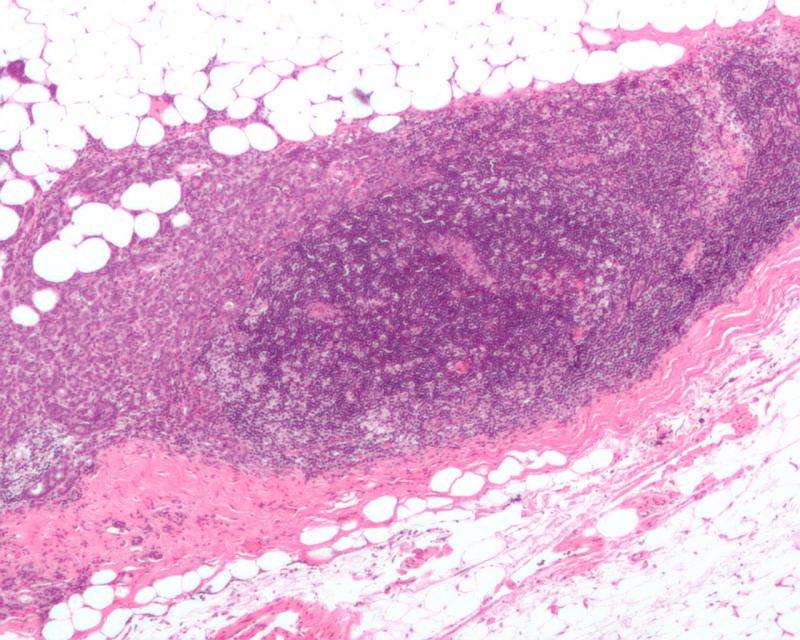September 26, 2016 report
Link found between circadian rhythm gene and spread of certain breast cancer

(Medical Xpress)—A team of researchers at the National Cancer Institute has found a possible link between genes responsible for regulating the circadian rhythm and the spread of a certain type of breast cancer. The team has posted a paper describing their study and results on the open access site PLOS Genetics.
A lot of progress has been made in treating people with breast cancer—so much so that the survival rate for patients with breast cancer that has not metastasized is now 99 percent. For those whose cancer has spread, the news is not so good; the survival rate is just 26 percent after five years. For this reason, most breast cancer research now is focused on cancers that have spread.
Scientists have known for some time that there is a link between the survivability of certain types of breast cancers and sleep patterns—women working swing shifts, for example, have been found to be more susceptible to death due to metastasis associated with breast cancers. But until now, there were no real clues as to why this might be the case, though some research suggested there may be a genetic link. In this new effort, the researchers describe how they focused their study on genes that might be impacted by irregular sleep patterns and wound up discovering a connection between the aggressive estrogen receptor negative breast cancer and a gene called Arntl2, which is involved in the circadian rhythm—it codes for a protein that is involved in activities within cells.
The team found the gene by interbreeding mice more prone to metastatic breast cancer with low-risk mice and then looking at their genetic differences. Once the gene was isolated, the team edited it in some test mice and then monitored the development of cancers. Those injected with high amounts of Arntl2 showed much more metastatic growth than those given low doses. Convinced that they had found a link, the researchers tested human patients that had estrogen receptor negative breast cancer and found that those who had inherited highly active variants of Arntl2 were more likely to die due to their cancer spreading.
These findings suggest that disruptions to the circadian sleep pattern may put people with aggressive forms of cancer at higher risk of dying from metastasized cancer than those with normal sleep patterns, particularly those with the active variant of Arntl2.
More information: Ngoc-Han Ha et al. The Circadian Rhythm Gene Arntl2 Is a Metastasis Susceptibility Gene for Estrogen Receptor-Negative Breast Cancer, PLOS Genetics (2016). DOI: 10.1371/journal.pgen.1006267
Abstract
Breast cancer mortality is primarily due to metastasis rather than primary tumors, yet relatively little is understood regarding the etiology of metastatic breast cancer. Previously, using a mouse genetics approach, we demonstrated that inherited germline polymorphisms contribute to metastatic disease, and that these single nucleotide polymorphisms (SNPs) could be used to predict outcome in breast cancer patients. In this study, a backcross between a highly metastatic (FVB/NJ) and low metastatic (MOLF/EiJ) mouse strain identified Arntl2, a gene encoding a circadian rhythm transcription factor, as a metastasis susceptibility gene associated with progression, specifically in estrogen receptor-negative breast cancer patients. Integrated whole genome sequence analysis with DNase hypersensitivity sites reveals SNPs in the predicted promoter of Arntl2. Using CRISPR/Cas9-mediated substitution of the MOLF promoter, we demonstrate that the SNPs regulate Arntl2 transcription and affect metastatic burden. Finally, analysis of SNPs associated with ARNTL2 expression in human breast cancer patients revealed reproducible associations of ARNTL2 expression quantitative trait loci (eQTL) SNPs with disease-free survival, consistent with the mouse studies.
PERSPECTIVE: Linda D. Siracusa et al. The Clock Is Ticking: Countdown to Metastases, PLOS Genetics (2016). DOI: 10.1371/journal.pgen.1006299
© 2016 Medical Xpress
















